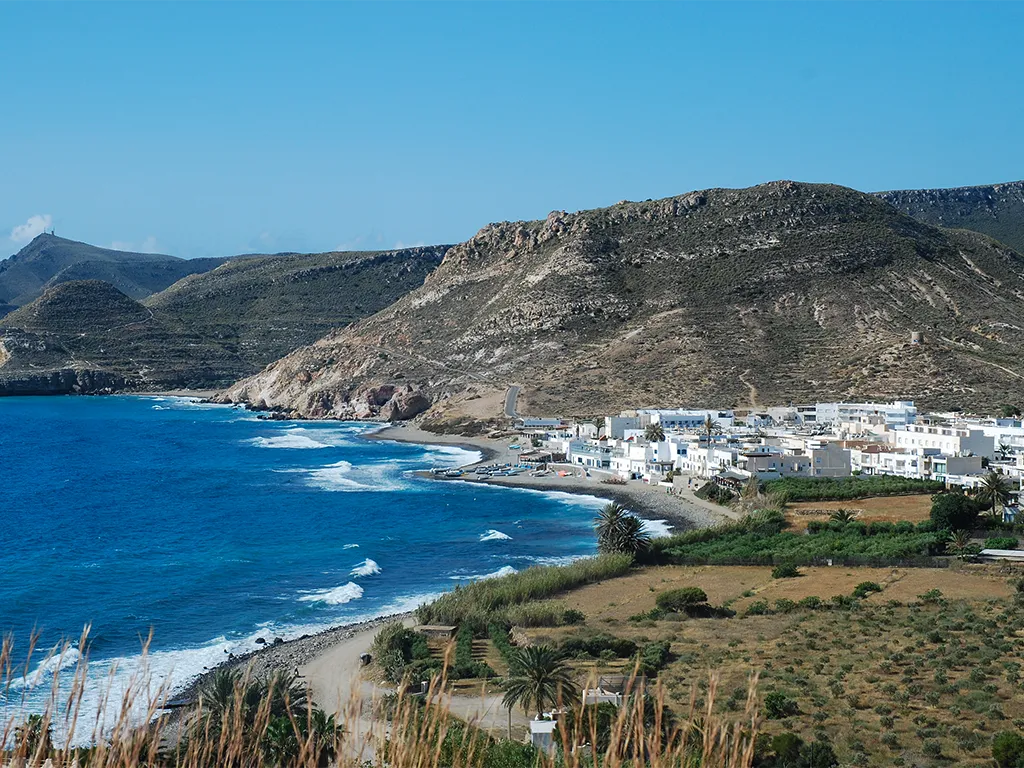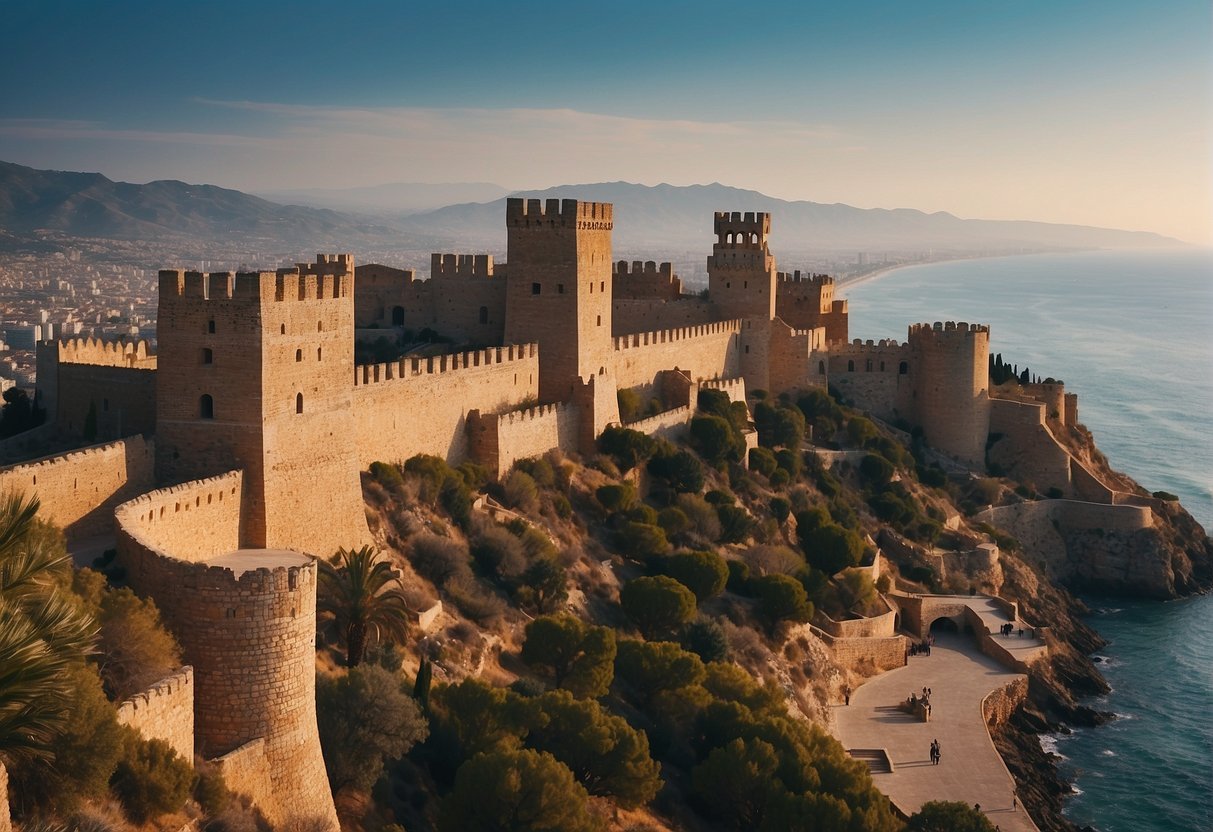Almería: A Gem on Spain’s Southern Coast
Related Articles: Almería: A Gem on Spain’s Southern Coast
Introduction
With enthusiasm, let’s navigate through the intriguing topic related to Almería: A Gem on Spain’s Southern Coast. Let’s weave interesting information and offer fresh perspectives to the readers.
Table of Content
Almería: A Gem on Spain’s Southern Coast

Almería, a province nestled in the southeastern corner of Spain, boasts a unique blend of history, culture, and natural beauty. Situated on the Mediterranean coast, it offers a captivating landscape of rugged mountains, sun-drenched beaches, and vast desert plains.
Almería’s Geographical Significance
Almería occupies a strategic location on the map of Spain, acting as a bridge between Europe and Africa. Its proximity to the Strait of Gibraltar and the North African coast has shaped its history and cultural identity. The province is divided into two distinct regions: the coastal zone, characterized by its fertile plains and vibrant coastal towns, and the inland zone, dominated by the dramatic Sierra Nevada mountain range.
A Tapestry of History
Almería’s history stretches back millennia, with evidence of human settlements dating back to prehistoric times. The Phoenicians, Romans, and Moors have all left their mark on the region, contributing to its rich cultural heritage. The city of Almería itself, founded by the Moors in the 9th century, flourished as a major trading center during the Islamic Golden Age. Its iconic Alcazaba fortress, a magnificent example of Moorish architecture, stands as a testament to this glorious past.
Natural Wonders and Diverse Landscapes
Almería’s natural beauty is a sight to behold. The Cabo de Gata-Níjar Natural Park, a UNESCO Biosphere Reserve, showcases dramatic volcanic landscapes, pristine beaches, and diverse marine life. The Sierra Nevada, Spain’s highest mountain range, offers breathtaking views and opportunities for hiking, skiing, and exploring its unique flora and fauna. The province also boasts vast desert plains, known as the "Tabernas Desert," which have served as a backdrop for numerous Western films.
A Culinary Paradise
Almería’s cuisine is a delightful fusion of Mediterranean and Moorish influences. Fresh seafood, locally grown fruits and vegetables, and aromatic spices are staples of the region’s culinary tradition. The province is renowned for its production of high-quality olive oil, almonds, and dates. Visitors can indulge in traditional dishes like "gazpacho," a refreshing cold soup, and "ajoblanco," a creamy almond soup.
A Cultural Hub
Almería is a vibrant cultural hub, offering a variety of museums, theaters, and festivals throughout the year. The Museo Arqueológico de Almería houses an impressive collection of artifacts from the region’s rich history. The city’s annual "Festival de Cine de Almería" celebrates the province’s cinematic heritage. The province also boasts numerous traditional festivals, including the "Feria de Almería," a lively celebration of local culture and heritage.
Almería on the Map: A Growing Destination
Almería’s unique blend of history, culture, and natural beauty has made it an increasingly popular tourist destination. The province offers a wide range of activities, from exploring ancient ruins to relaxing on pristine beaches, making it an ideal destination for families, couples, and adventure seekers alike.
FAQs about Almería
Q: What is the best time to visit Almería?
A: Almería enjoys a Mediterranean climate with warm, sunny summers and mild, wet winters. The best time to visit is during the spring (March-May) and autumn (September-November) when the weather is pleasant and the crowds are smaller.
Q: What are the must-see attractions in Almería?
A: The Alcazaba fortress, the Cabo de Gata-Níjar Natural Park, the Tabernas Desert, the Cathedral of Almería, and the Museo Arqueológico de Almería are among the top attractions in the province.
Q: What are the best beaches in Almería?
A: Almería boasts a variety of beautiful beaches, including Playa de los Genoveses, Playa de Monsul, Playa de San José, and Playa de El Playazo.
Q: Is Almería a safe city?
A: Almería is generally considered a safe city, with low crime rates. However, it’s always advisable to take precautions, especially in crowded areas.
Q: How do I get to Almería?
A: Almería is easily accessible by air, with an international airport that connects to major cities across Europe. The city is also well-connected by train and bus.
Tips for Visiting Almería
- Book accommodation in advance: Especially during peak season, it is advisable to book accommodation well in advance to secure the best deals.
- Learn some basic Spanish: While many locals speak English, knowing some basic Spanish phrases will enhance your travel experience.
- Rent a car: A car is highly recommended for exploring the province’s diverse landscapes.
- Pack for all types of weather: Almería’s climate can be unpredictable, so pack for both hot and cool weather.
- Try the local cuisine: Don’t miss the opportunity to sample Almería’s delicious cuisine.
- Respect the environment: Be mindful of the environment and leave no trace behind.
Conclusion
Almería, with its captivating history, stunning natural beauty, and vibrant culture, offers a unique and rewarding travel experience. Its strategic location on the map of Spain makes it an ideal gateway to explore the Andalusian region and beyond. Whether you’re seeking historical insights, outdoor adventures, or simply a relaxing getaway, Almería has something to offer everyone.








Closure
Thus, we hope this article has provided valuable insights into Almería: A Gem on Spain’s Southern Coast. We thank you for taking the time to read this article. See you in our next article!